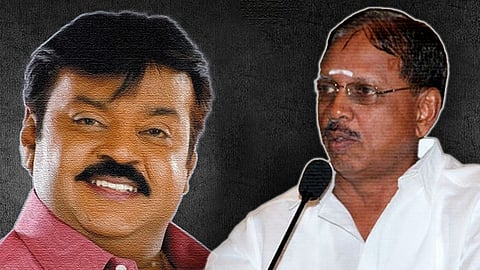

On December 28, Tamil Nadu woke up to the tragic news of ‘Captain’ Vijayakant’s passing. The late actor and Desiya Murpokku Dravida Kazhagam (DMDK) chief died at the age of 71 from a prolonged pulmonary illness. He had also contracted COVID-19 and was on ventilator support from Wednesday. Ever since the news of his death came out, condolences have poured in from everyone from film personalities and politicians to the public who loved him. Earlier on Thursday, 10 am shows in all theatres across Tamil Nadu were cancelled as a mark of respect. Film shootings have also been put on hold in order to allow industry personalities to pay their last respects to Vijayakant, who had from 2000 to 2006, served as the president of the South Indian Cine Artistes’ Association, more commonly known as the Nadigar Sangam.
TNM caught up with the president of the Tamil Nadu Theatre and Multiplex Owners Association, Tirupur Subramaniam, to look back on Vijayakant’s illustrious career as an actor.
What did Vijayakant mean to Tamil cinema?
Vijayakant and I entered Tamil cinema around the same period – between 1978 and 1980. From the beginning, he treated everyone equitably. Whatever food was served to the hero, he insisted that the same must be served even to the lightman. Similarly, a theatre owner or a distributor could meet and speak to him with ease. He was respectful towards everyone.
There are two significant periods in the history of the Nadigar Sangam. One is under MGR’s leadership, the other is under Vijayakant’s. When he was the Nadigar Sangam president, he made sure to clear all the debts the Association was struggling with.
Another memorable fact about him is that even if lesser-known producers were not able to pay him properly, he would still finish acting in their films. He was a good human being.
Can you tell us more about how he treated everyone equitably? How was he in shooting sets?
Whatever respect he gave to the producer or to a co-star, he would extend the same to the lightman or watchman.
He lived very modestly. It was only on screen that he donned coats and suits. In real life, in the 42 years that I knew him, he only wore khadi veshtis and shirts. He would never wear any extravagant clothes. The sort of simple tastes that he had when he first entered the cine field, he maintained even after becoming a popular hero. It is unimaginable to see someone like that. There are very few such people and Vijayakant was one of them.
Among the people, he was called ‘Karuppu (Black) MGR’. He lived up to that title 100%. Just as MGR earned a name for himself among the people with charitable acts, Vijayakant did the same. The fire never died out in the kitchen of his Raja Bathar Street office — anyone could go there to get a meal.
Can you elaborate on how Vijayakant saved the Nadigar Sangam from bankruptcy?
The Nadigar Sangam was in so much debt that its offices were on the verge of being auctioned off. As the president, he invited Rajinikanth and Kamal Hassan and others to a ticketed cultural event in Singapore and used the earnings to clear the debts and save the Association.
As a theatre owner, can you speak about how his entry into Kollywood, at a time of giants like Rajini and Kamal, influenced the cinema-viewing space?
Vijayakant had his own screen personality and a distinct style of enacting fight sequences. He never used stunt doubles. His peculiar manner of kicking off from walls in a fight was new to Tamil cinema and that attracted audiences. He was popular among youngsters at that time.
After MGR and Rajini, it was Vijayakant who could deliver films that would do well in A, B, and C tiers. He was not an actor only loved in big cities, he films ran in theatres in small villages too. To add to that, Vijayakant was one of the few stars whose many films ran in theatres for more than a 1oo days.
Vijayakant could have easily been overshadowed by bigger stars, yet he gave chances to first-time directors. What ideals drove him as a film personality?
He was the one who opened doors for many students from the South India Film Institute. If some of them have become big names now, it is because of Vijayakant. For example, his role in Oomai Vizhigal (1986) was supposed to be only a guest appearance. But as it was a wholesome role, he played the hero. R Aravindraj, the director, got his introduction into Kollywood through this. Similarly, he acted in RK Selvamani’s directorial debut Pulan Visaranai (1990) and brought him into the field as well. [Incidentally, it would be Selvamani’s next film, also starring Vijayakant, titled Captain Prabhakaran (1991), that would forever seal the late actor’s epithet of ‘Captain’.]
Also read:
Goodbye, Captain: Actor and DMDK chief Vijayakant passes away
Remembering Vijayakant: Tributes Pour in for the Revolutionary Artist and DMDK Leader
‘Captain was second only to MGR, challenged TN’s two-party system’: Ex Min. K Pandia Rajan
Rajinikanth’s cigarette and the start of Vijayakant’s DMDK
Vijayakant's film journey: How Captain managed to hold his ground
Goodbye, Captain: Actor and DMDK chief Vijayakant passes away | Tamil Nadu| Shabbir Ahmed